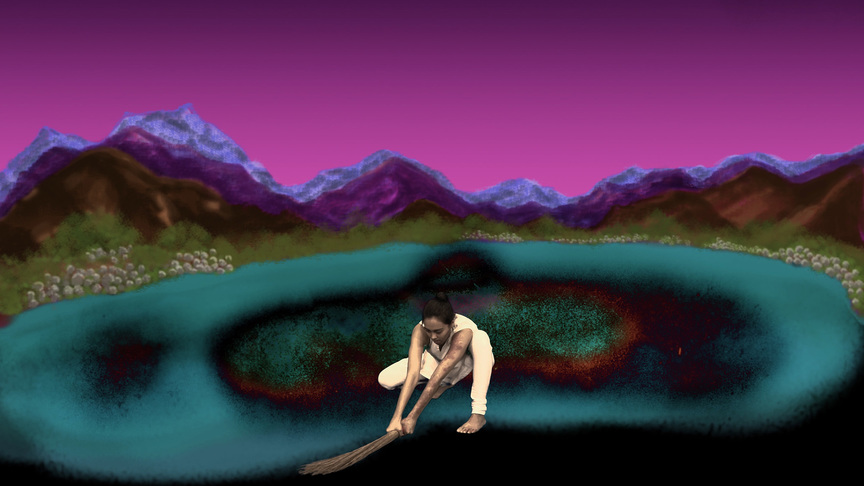-
From Current Issue
-
- Editor’s Letter Fire in the Heart
- Reviews I Gusti Ayu Kadek Murniasih
- Reviews 11th Seoul Mediacity Biennale: “One Escape at a Time”
- Dispatch Networked China
- One on One Monira Al Qadiri on Yukio Mishima
- Essays The rise of independent art spaces in pandemic-era Shanghai
- Features Tuan Andrew Nguyen
- Table of Contents
- Web Exclusives
- Archive
- Subscribe

R
E
V N
E
X
T
Installation view of RAQS MEDIA COLLECTIVE’s Spinal, 2018, projection: 10 min 24 sec, part of Not Yet at Ease, 2018, modular padded structure with fabric ceiling, padded stools, six videos displayed on four monitors and two projections, six channel audio, dimensions variable, at “Spinal,” Frith Street Gallery, Golden Square, London, 2019. All images courtesy the artists and Frith Street Gallery, London.
Psychological distress spurred by experiences of conflict are today recognized, medicalized and to an extent trivialized, as seen in the global lack of adequate state provision for ex-servicemen experiencing post-traumatic stress disorder (PTSD). While this condition remains undertreated, the contemporary understanding that mental disorder can arise from experiences of warfare has not always been the case, as Raqs Media Collective explored in their solo exhibition at Frith Street Gallery, “Spinal.” On display was a single multipart installation, Not Yet at Ease (2018)—an iteration of Raqs’ commission for the British public cultural initiative 14–18 NOW and Colchester cultural center Firstsite to celebrate the centenary of the First World War.
The show opened with the silent film Spinal (2018), in which a computer-rendered human anatomical model, cut open to reveal its spinal column, inhabits a deserted backdrop of barracks under a moonlit, cobalt-blue sky. A woman’s hands reach around to lightly caress the model’s spine, as a second female figure circulates the form while enacting a series of slow movements, such as limping, and raising her arms as if resting on an invisible support. As her image multiplies, ghosts of her previous forms collect and amass. Informed by Raqs’ archival research, these bodies reference descriptions of common WWI injuries: trench spine, trench foot, gas gangrene, and melancholy. These were the conditions that Indian soldiers could officially suffer from; the British medical hierarchy precluded a diagnosis of “shell shock,” now classified as PTSD, for Indian fighters.
Past the film projection, a white, labyrinthine structure opened up, with pockets of padded cells reminiscent of an asylum. Encapsulated in this claustrophobic and haunting immersive installation are fragments of archival materials collated by Raqs pertaining to the Indian attachments involved in Britain’s war efforts. For instance, in the sound piece that resonates throughout the structure, a male voice recites lines from wartime novels and poetry, layered over clips of atmospheric noises taken from rare recordings made by German linguist and archivist Wilhelm Doegen during the war. Electrical signals buzz and snatches of servicemen singing can be heard through the crackling audio. Simultaneously, an impassive female voice reads excerpts from letters and diary entries of servicemen. “Doctors are a set of blind people. There are many diseases they cannot diagnose,” one letter details. “I am as it were solitary and alone, belonging to no one,” states another. These expressions of private frustration and pain, coupled with accounts of the British medical establishment’s skepticism toward the soldiers’ reported symptoms, bounce from wall to wall.
Through gaps in the padded panels, video pieces can be viewed—each one a composite of candid photographs and personal film footage from army bases with contemporary objects and female stagings of the servicemen’s duties and experiences. In Cleaning, a woman sweeps the floor, creating phantasmagoric pools of color. A glowing ornamental light fitting is superimposed over a historic film in Chandelier, swinging and ricocheting toward the viewer, in part obscuring a group of soldiers competitively doing handstands and playing games. This snippet of recreation, a rupture in wartime activity, is juxtaposed with a neighboring film, Tremble, which depicts a woman’s body twitching on an institutional bed. A faint image of a soldier’s face appears in and out of focus on her clothing while another military figure watches her.
With “Spinal,” Raqs sought to find the knots and motivations implicit in wartime structural politics and the British medical system of knowledge at the time. In presenting the testimonies of Indian soldiers and shedding light on their poor treatment, Raqs not only problematized India’s contribution to the war, foregrounding the racialized medical hierarchies to which they were privy, but also thought forward. A century after the events depicted, this show directed us to consider the normalization of war and its attendant traumas. Given the world’s ongoing armed conflicts—particularly across the Middle East, the modern borders of which were mostly drawn in the aftermath of WWI—the show is cause to reflect on the war’s legacy, and realize, as Raqs told me when we met in Colchester last year, that in some ways, “it’s never ended.”
Raqs Media Collective’s “Spinal” is on view at Frith Street Gallery, Golden Square, London, until March 16, 2019.
To read more of ArtAsiaPacific’s articles, visit our Digital Library.


















